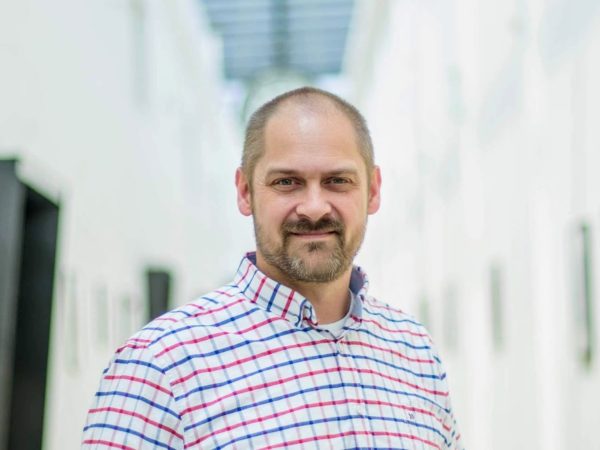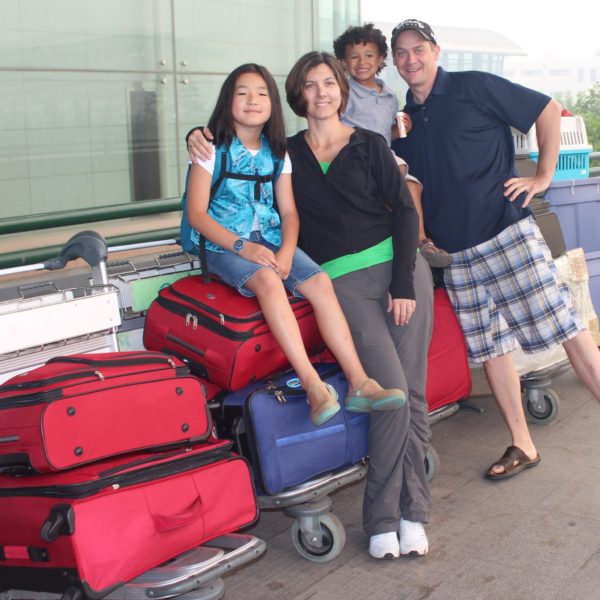I recently came across a wonderful human being. He is, among many other things, an expat. His intercultural experience is so vast, that coming up with a satisfying interview was a real challenge. I tried, and I am happy to invite you to meet Jerry, of The Culture Blend, and be as inspired by him as I was.
Jerry, you are from the US, live in China, and have a lovely multicultural family. How and when did it happen that you “went intercultural”?
I have dreamed of faraway places for as long as I can remember. I grew up very mono culturally in the U.S. but have always been extremely fascinated by other cultures. My wife and I did a 6 month internship in Taiwan in college where we first fell in love with the Chinese culture and people. We adopted our daughter from mainland China in 2003, and got a taste of what it might look like to live here. We expatriated for the first time in 2006 and have spent most of the time since here.

And you have also shaped your work on interculturality, right? Tell us what you do.
I help people navigate the challenges and find the opportunities that come with living cross-culturally. Specifically I provide training and coaching for teams and individuals that focus on every stage of their experience from preparation and entry to departure and repatriation. I also write and build resources to equip them on that journey. I have worked most prominently with staff at international schools but have also worked with corporate teams and other organizations. The heart of what I do is to peel back the layers and get to the nuance of challenges that people face instead of simply slapping a cookie cutter, data dump on them that has no impact. I love watching people succeed at what they came to do and connect with the world in a way they didn’t see coming.
 I’d like to talk about the “opportunities that come with living cross-culturally”. Besides the obvious (and we have repeatedly heard how living abroad makes your more flexible, tolerant, etc.), how does exposure to different people and lifestyles equip us with tools we can effectively use to make the world a better place?
I’d like to talk about the “opportunities that come with living cross-culturally”. Besides the obvious (and we have repeatedly heard how living abroad makes your more flexible, tolerant, etc.), how does exposure to different people and lifestyles equip us with tools we can effectively use to make the world a better place?
I believe that something beautiful happens when you live cross-culturally. Two things actually.
Of course it is rich when you get the chance to observe and interact with a group of people who sees the world from a different perspective. The process of learning about a people adds so much to any person’s life. To be stretched by the way “they” do things is a challenge on the front end but ultimately becomes a wonderful, first hand training ground that gives you access to a broader scope. Working through those challenges provides you with more answers for how issues can be dealt with. Watching how other cultures have learned to solve the same problems that you have gives you a choice in how to move forward. So, actually living in a culture (versus just visiting it) affords you the time you need to move from “they’re doing it all wrong” to “hmm, that’s brilliant, I might try that.”
 The bigger beauty happens, though, when you get to see your own culture through different lenses. It is a painful and powerful experience to process your own world view from a different perspective. When that happens you become more equipped with the kind of empathy that the world needs desperately. In the current political and social climate, people who are not only globally aware but SELF aware are the ones that I want to take the lead. The opportunities expand exponentially when you can see the world and yourself from a different angle.
The bigger beauty happens, though, when you get to see your own culture through different lenses. It is a painful and powerful experience to process your own world view from a different perspective. When that happens you become more equipped with the kind of empathy that the world needs desperately. In the current political and social climate, people who are not only globally aware but SELF aware are the ones that I want to take the lead. The opportunities expand exponentially when you can see the world and yourself from a different angle.
When someone embraces what they can learn from other cultures and what they can learn about themselves, they become a bridge of understanding between others who have not had that experience. In a rapidly globalizing environment there are people who are struggling to make sense of other people. Bridges become essential in every space and the gates are opened for cross-cultural people to provide support, insight and understanding. That can be a great resource in professional, personal and relational contexts.
I’m interested in how biases, prejudice and the racism many of us have deep within themselves and living cross-culturally link. I recently read two things that were illuminating for me: one is White Fragility, a fabulous book by US-educator Robin Diangelo, the other is your article about the privileges of the white expat. Both made me think of how hard realizing the depth of these mechanisms is for some of us (i.e. the privileged ones). In some cases we even protect ourselves from understanding. Or we feel threatened and close within our bubbles. How can living interculturally practically help to curb racism and discrimination?
Racism and bias are such loaded topics. They are packed with the most broken bits of history, experience, emotion, politics, culture and an endless list of other factors, which are then multiplied by the number of people in the world. The conversation is almost exclusively driven on the premise of being right and overpowering someone else’s ignorance with a false hope that it will bring about real change. “I’ve got it figured out. You’re wrong”. That’s the inherent danger of living in a herd. When everyone around you is just like you, the group builds a world view and supports it with a very limited scope. Then they respond passionately and sometimes violently to the other herds who challenge their thinking.
When you only spend time in a group of people who are just like you, your thinking is rarely challenged. Other cultures are simply scenery — but when you separate yourself from the herd and spend time in another one they become people. You no longer have the luxury of thinking you know everything. You get blasted with real life stories from the perspective of real life people and you get to see their history, experience, emotion, politics and culture through their eyes. That may not change everything (or anything) about yours but it should at least bring you to a space where you are willing to admit there is more to it. Living abroad confronts you with your own ignorance and challenges you to do something more than point out the ignorance of others.
Deep relationships with people who live and act and speak and think differently are the best hope for breaking down racism and discrimination — because, let’s face it, loud opinions and eloquent “rightness” aren’t working so well.
Interview by Claudia Landini
March 2020
Photos ©JerryJones
 Previous Post
Previous Post Next Post
Next Post